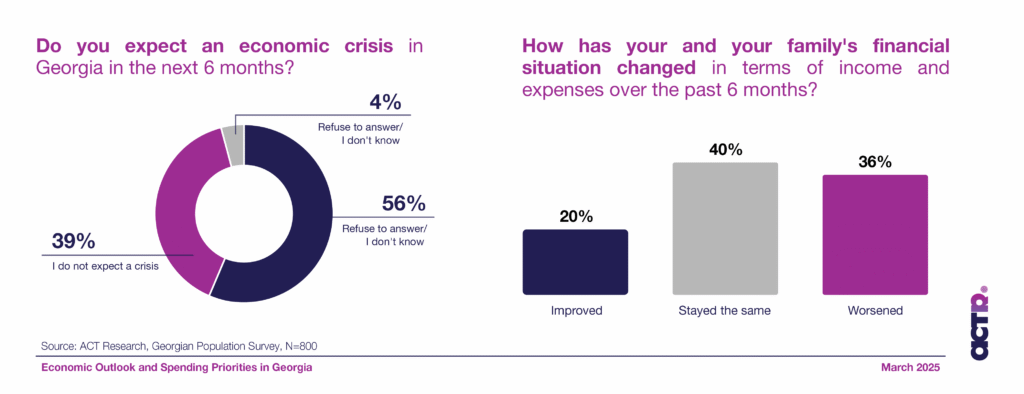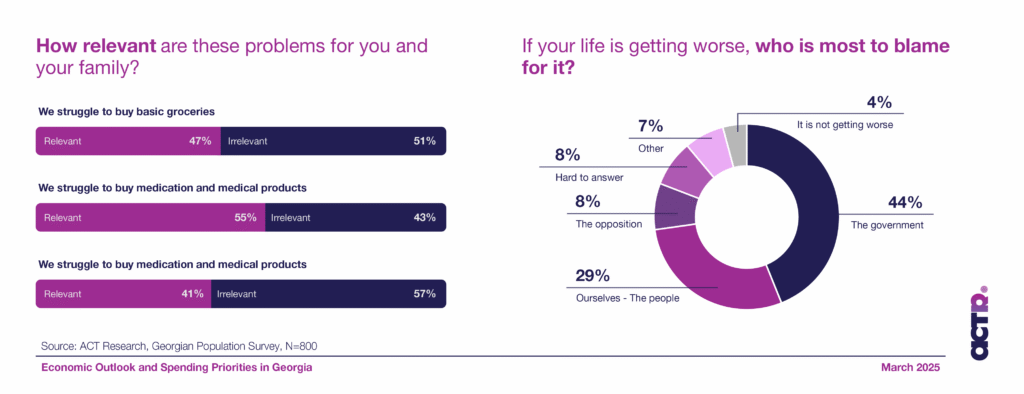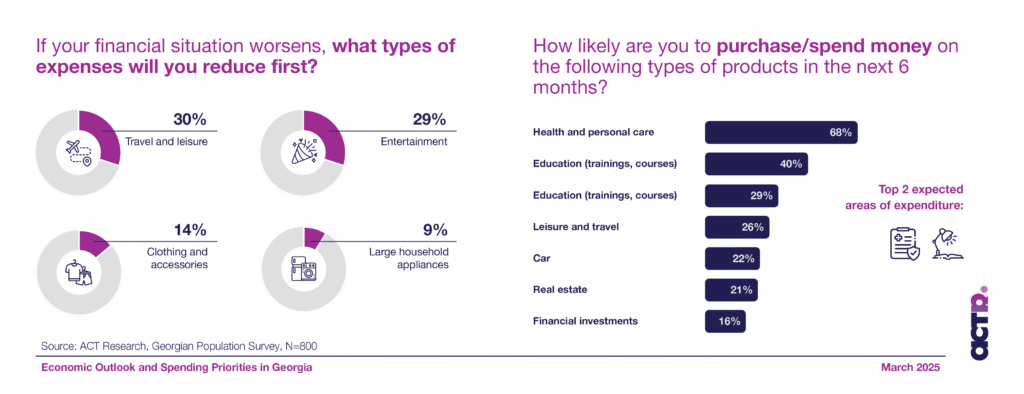The population of Georgia is expecting an economic crisis – Insights from ACTR’s New Research

The population of Georgia is expecting an economic crisis – Insights from ACTR’s New Research
Against the backdrop of local and global political tensions, the issue of economic stability takes on special importance.
According to a public opinion survey conducted by ACT Research, aimed at studying the economic outlook and spending priorities of the population of Georgia, it is evident that the expectation of an economic crisis is quite high among the public. More than half of Georgia’s population, 56% believes that a financial crisis has either already begun or will begin within the next 6 months. This prediction is accompanied by negative assessments regarding personal material circumstances: 36% of the population has seen a decline in their financial situation over the past 6 months. It seems that the fear of an economic future is not just a theoretical expectation, but is already grounded in the existing reality.

Economic challenges are clearly visible in the daily lives of the population: 47% of the population struggles to purchase basic grocery products, while 55% find it difficult to purchase medication and medical services. This indicates that the limitation of financial resources critically affects people’s daily, basic needs.
Against the backdrop of economic difficulties, it becomes especially relevant to determine who is responsible for the current situation and who should be the main actor in the process of its resolution. 44% of the population holds the government responsible for the declining living conditions. This trend clearly indicates that the public perceives the government as the main decision-maker and the primary force driving changes in the economic situation. At the same time, 29% take responsibility for themselves and note that they too have contributed to the current situation.

Expected change in consumer behavior – What types of expenses will decrease and increase during an economic crisis?
The expectation of a worsening economic situation not only affects the population’s attitudes but also changes their financial plans. Under economic pessimism, citizens begin to reassess their spending and are primarily ready to reduce expenditures that are not considered essential needs. It is in this process that sectors are identified where spending cuts are most likely to occur, as well as areas that still maintain high spending potential.
In the event of deepening economic problems, the population primarily targets the HORECA sector for spending cuts. According to the survey results, 30% of the population plans to save on travel and leisure, while 29% intend to cut back on entertainment. These figures indicate that, amid the deepening financial crisis, the HORECA business faces the highest risk of a decline in customers.
In conditions of economic instability, the population still maintains a high spending inclination in certain categories, indicating the strategic importance of these services and products.
Specifically, 68% of respondents say they are likely to spend money on health and personal care products in the next 6 months. This confirms that health remains the highest priority for the population.
Additionally, 40% are considering spending on education, which could be perceived as a long-term investment in their future. This suggests a sentiment among part of the population to overcome economic instability through professional development.
The minimal spending inclination is observed in the direction of financial investments, with only 16% considering putting money into investments. This trend reflects that, in an unstable economic environment, the population is less inclined to allocate resources into risky assets. In these conditions, covering essential needs and maintaining financial stability in daily life becomes of paramount importance.

Ultimately, it is clear that there is an expectation of economic downturn among the population, which affects their financial plans and spending priorities. The main focus is placed on essential needs for survival, while relatively non-essential areas, such as travel, leisure, and entertainment, become less of a priority.
*The survey was conducted through random sampling among 800 adult individuals across Georgia. The survey took place from March 17 to 23, 2025. The statistical error of the data does not exceed 3.5% on average. The method used was telephone surveying.
___
This study was conducted at the initiative of the company “ACT Research” (ACTR) within the framework of its Corporate Social Responsibility (CSR) program, under the rubric “Voice of the Society”.
ACTR’s CSR policy is based on an approach focused on public well-being and the generation of timely, evidence-based data to better understand societal issues. To this end, ACTR periodically conducts public opinion research in four main areas:
“Voice of Society” – studying social and civic attitudes;
“Voice of the Consumer” – analysis of consumer behavior and needs;
“Voice of Business” – research on private sector trends and expectations;
“Digital Trends” – monitoring technological and digital changes.
The goal of the initiative is to improve access to data and promote informed, public interest–based decision-making in both the private and public sectors.
ACTR ensures data transparency and accessibility – as one of the key mechanisms for creating public value.